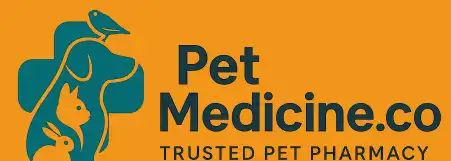10 Most Common Veterinary Medicines Every Pet Parent Should Know
When it comes to keeping your furry companions healthy, common veterinary medicines play a crucial role in prevention, treatment, and long-term care. Whether your pet is dealing with parasites, joint pain, or heart disease, having a clear understanding of the most widely used veterinary medicines helps you become a more informed and responsible pet parent.
This guide will walk you through the 10 most common veterinary medicines used for dogs and cats, their importance, safe usage, and why buying them from a trusted veterinary pharmacy like PetMedicine.co is essential.
🐾 Why Understanding Veterinary Medicines Matters
Pets rely on us for their health and well-being. Unlike humans, they cannot express discomfort directly, which means timely medication often prevents minor issues from becoming major health concerns. Unfortunately, many pet parents either:
-
Use human medicines (which can be toxic to pets).
-
Buy fake or expired medicines from unreliable sources.
-
Miss proper dosage and schedule guidance.
By knowing the most common veterinary medicines, you ensure your pet receives the right treatment, at the right time, with proper veterinary support.
1. Antibiotics for Pets
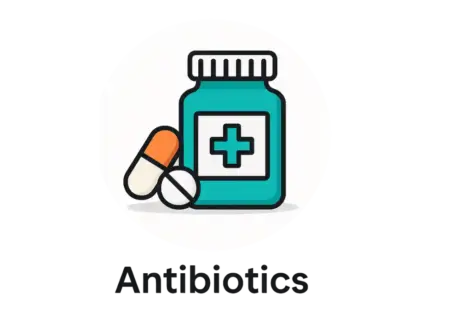
Antibiotics are among the most common veterinary medicines prescribed to dogs and cats. They help treat bacterial infections such as skin wounds, ear infections, urinary tract infections (UTIs), and respiratory problems.
-
Examples: Amoxicillin, Cephalexin, Enrofloxacin.
-
Forms: Tablets, liquid suspensions, injections.
-
Key Benefit: Stops bacterial growth and speeds up recovery.
👉 Browse our Antibiotics for Dogs & Antibiotics for Cats.
⚠️ Note: Antibiotics should never be given without veterinary consultation, as misuse can cause resistance and harm your pet’s gut health.
2. Deworming Medicines
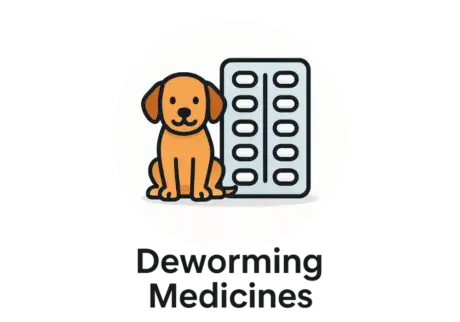
Parasites like roundworms, hookworms, and tapeworms can cause digestive issues, weight loss, and anemia in pets. Dewormers are one of the most common veterinary medicines every pet owner must keep on schedule.
-
Popular Brands: Worex, Drontal, Endogard.
-
Dosage: Based on weight and age (usually every 3–6 months).
-
Why it’s essential: Prevents malnutrition and parasite-related diseases.
👉 Shop Dog Dewormers | Cat Dewormers.
💡 Tip: Puppies and kittens require more frequent deworming than adults.
3. Tick & Flea Preventive Medicines
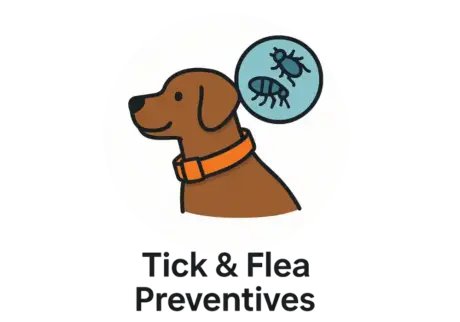
Ticks and fleas are not just pests—they transmit diseases like ehrlichiosis and Lyme disease. Preventive tick & flea solutions are among the most common veterinary medicines in India.
-
Options: Spot-on solutions, oral chews, medicated collars, and sprays.
-
Best Known Products: Bravecto, Simparica, Fiprofort, Seresto Collar.
-
Frequency: Monthly or quarterly, depending on the brand.
👉 Browse our Tick & Flea Solution for Dogs & Tick & Flea Solution for Cats.
⚠️ Important: Tick & flea prevention should be year-round, not seasonal.
4. Pain Relief & Anti-Inflammatory Medicines
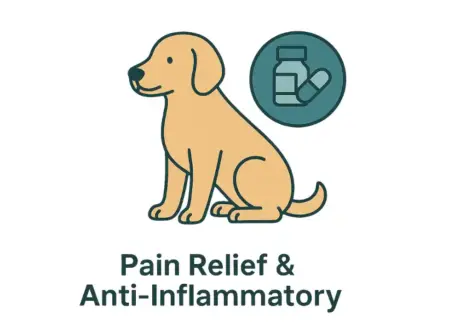
Just like humans, pets experience pain from injury, surgery, or arthritis. Pain relief is a crucial part of common veterinary medicines.
-
Common NSAIDs for Pets: Carprofen, Meloxicam.
-
Benefits: Reduces inflammation, eases pain, improves mobility.
-
Warning: Human painkillers like ibuprofen or paracetamol are toxic for pets.
👉 View our Pain & Wound Care for Dogs and Pain Care for Cats.
5. Joint & Mobility Supplements
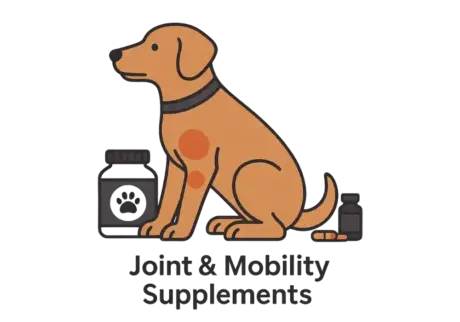
Senior dogs and cats often face stiffness, hip dysplasia, or arthritis. Supplements fall under the category of common veterinary medicines for long-term care.
-
Key Ingredients: Glucosamine, Chondroitin, Omega-3 fatty acids, MSM.
-
Form: Chewables, powders, or capsules.
-
Benefit: Improves joint lubrication, reduces pain, and supports mobility.
👉 Shop Dog Joint Care | Cat Joint Care.
6.Eye & Ear Medicines for Pets
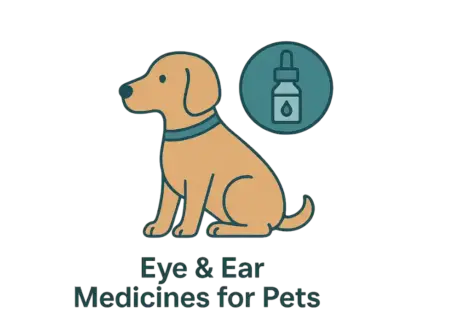
Eye and ear problems are common in both dogs and cats. Issues such as conjunctivitis, cataracts, ear mites, or chronic ear infections can cause discomfort and, if untreated, lead to serious complications. That’s why eye & ear medicines are an essential part of common veterinary medicines for pets.
-
Eye Medicines: Includes antibiotic eye drops (for infections), lubricating drops (for dryness), and anti-inflammatory solutions (for redness or swelling). Common examples: Ciprofloxacin eye drops, Tear substitutes, Atropine drops.
-
Ear Medicines: Used for bacterial, fungal, or mite-related ear infections. They usually combine antibiotics, antifungals, and anti-inflammatory agents. Common examples: Otitis treatment drops, Ivermectin drops for ear mites.
-
Symptoms to Watch: Red eyes, discharge, constant scratching at ears, head shaking, foul smell from ears.
-
Vet Guidance Required: Dosage and type of drops vary by condition. Overuse or wrong medicines may damage sensitive organs.
👉 Browse our Dog Eye & Ear Care | Cat Eye & Ear Care.
7. Cardiac Medicines
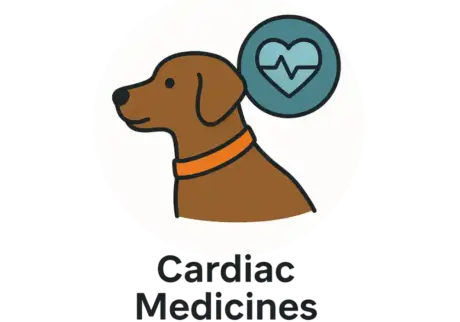
Heart conditions in pets require consistent management. Cardiac drugs are among the most common veterinary medicines prescribed for aging pets.
-
Examples: Pimobendan, Enalapril, Furosemide.
-
Purpose: Supports heart muscle function and prevents fluid buildup.
-
Common Uses: Congestive heart failure, valve diseases.
👉 See our Dog Cardiac Care | Cat Cardiac Care.
8. Kidney & Liver Support Medicines
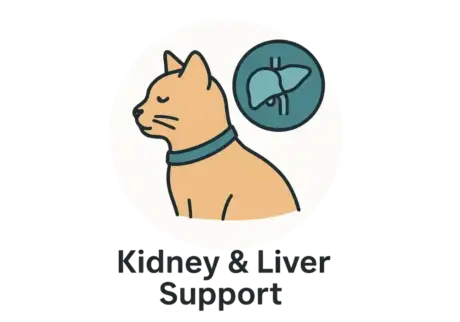
Kidney and liver disorders are common in older pets. These veterinary medicines help reduce toxin buildup and support organ health.
-
Examples: Samylin, Hepatoprotectives, Renal supplements.
-
Often paired with: Prescription veterinary diets.
-
Symptoms to watch: Increased thirst, vomiting, lethargy.
👉 See our Dog Kidney Care | Cat Kidney Care.| Cat Liver Care.| Dog Liver Care.
9. Dermatological Medicines
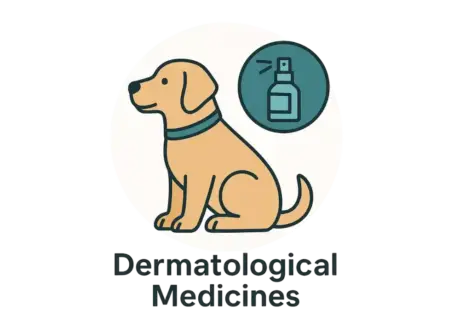
Skin problems like fungal infections, dermatitis, and allergies are common in pets, making dermatology products an essential part of common veterinary medicines.
-
Examples: Ketoconazole, Itraconazole, medicated shampoos, sprays.
-
Best for: Fungal infections, itching, rashes, hair loss.
-
Combined with: Allergy management diets and topical creams.
👉 Browse Dog Skin & Coat Care and Cat Skin & Coat Care.
10. Calming & Anxiety Relief Medicines

Stress and anxiety in pets can cause behavioral problems, loss of appetite, or even aggression. Anxiety care products are now considered common veterinary medicines for many households.
-
Common Medicines: Trazodone, Pexion.
-
Natural Alternatives: Calming chews with chamomile or L-theanine.
-
Use Cases: Fireworks, travel, separation anxiety.
👉 View our : Dog Calming Care | Cat Calming Care.
⚠️ Important Safety Tips for Using Veterinary Medicines
-
Always consult a vet before giving any medicine.
-
Dosage matters – what works for one breed or weight class may harm another.
-
Check expiry dates – expired medicines can lose potency or cause side effects.
-
Buy only from trusted sources like PetMedicine.co to ensure authenticity.
✅ Conclusion
These 10 common veterinary medicines are vital for maintaining the health of dogs and cats. From antibiotics and dewormers to heart, kidney, and anxiety support, knowing these categories helps pet parents be proactive and prepared.
But remember: while knowledge is empowering, only a veterinarian can prescribe the right medicine and dosage for your pet.
At PetMedicine.co, we ensure every product is authentic, stored properly, and delivered on time—so you can focus on what matters most: keeping your pets happy and healthy.
